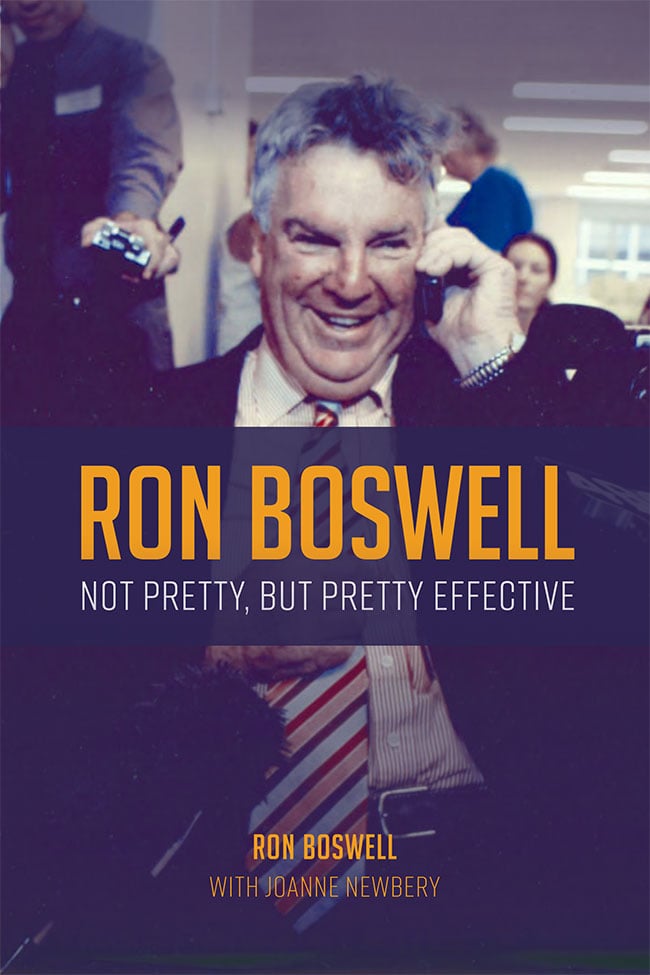Australia/Israel Review
Biblio File: Tale of a true Aussie battler
May 31, 2024 | Jamie Hyams
 Ron Boswell: Not pretty, but pretty effective
Ron Boswell: Not pretty, but pretty effective
Ron Boswell with Joanne Newbery
Connor Court Publishing, Dec. 2023, 320 pp., $39.95
Ron Boswell was a National Party senator for 32 years, making him the sixth longest-serving senator in Australian history. For 17 of those years, he was Nationals leader in the Senate. And now, in further service to Australia’s people, he has written a book about his experiences, about how a suburban insurance salesman rose to become a leading figure in the party that traditionally represents rural Australia and was able to significantly influence national policy.
Boswell’s is a fascinating but easy to read work, mixing anecdotes with personal philosophy and behind the scenes accounts of some seminal moments in Australian politics – such as the “Joh for PM” campaign that cruelled John Howard’s hopes in the 1987 Federal election and the Coalition carbon tax debate. However, what Boswell clearly remembers most fondly are the many times he used his small business experience and negotiating skills, especially as Senate leader, to understand and assist various sectors of the rural economy, to the benefit of the entire country.
However, probably most interesting to Jewish readers will be his accounts of his at times heroic battles with the antisemitic far right. His first brush with these extremists was with the Citizens Electorate Council (CEC), whom Boswell accurately describes as “a weird mob of racist and anti-Semitic conspiracy junkies” who “accuse the Royal family of being drug runners and claim that Parliament House in Canberra was designed along occult lines.”
This battle may have helped steel Boswell for one of the fights of his life. As the long-time doyen of Australian political journalists, Laurie Oakes, was later to write, “Bos is the bloke who fought almost singlehandedly to counter the growing influence of the League of Rights in Queensland conservative politics in the 1980s.”
Boswell had become concerned in the mid-to-late 1980s that the League was trying to infiltrate the Nationals, and was having success in infiltrating charismatic churches. So he decided to make a “landmark speech” in the Senate about them in April 1988, explaining exactly what the League was all about. He set out the League’s “anti-Semitism and racism, their denial of the Jewish Holocaust and their denial that Jesus Christ was a Jew.” The speech, he said, “absolutely wiped them off the political map,” and after it was distributed widely, including to the churches, “the pastors soon got rid of the League from their congregations.”
Boswell then went to League strongholds in rural Queensland to campaign against them, including one town where his staff were “approached by people in paramilitary gear and told that ‘if you believe Jesus Christ was a Jew, then you’re a Jew and the Jews are the devil’s people.’” But he persevered and eventually came out on top.
As Boswell explains, this moral and principled stand, when some were still suggesting the Nationals should regard the League of Rights as fellow conservatives to be harnessed rather than opposed, saw him become a “serious player”.This was ultimately responsible for him first becoming Nationals Senate leader in 1990. It even helped Boswell when he went to Mozambique to help a young Australian imprisoned there.
Boswell explains that to him, politics is about seeing what’s wrong, and taking action to stop it. Throughout the book, he gives examples of when he did just that, including exposing numerous other far right extremist groups. He writes, “As I tell my Jewish friends, if it wasn’t for the National Party, there would be no buffer stopping the anti-Semites getting a political foothold.” There is also a chapter about how he took on One Nation, exposing how it was “riddled with extremists like a termite infestation” and how detrimental it would be for the bush if Pauline Hanson’s anti-Asian policies were adopted.
As Boswell explains in the postscript, he wrote the book to encourage more people to aspire to enter parliament, by demonstrating what can be achieved. Throughout it, what shines through is Boswell’s passion for a fairer and better Australia. I strongly recommend Boswell’s work to anyone with an interest in Australian politics. However, even for those with no such leanings, it is still a very good read – an inspirational account of the good that can be achieved with some persistence and a healthy dose of principle.






